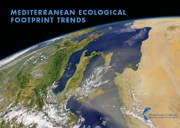 In a world of growing ecological overshoot—when our demands for nature’s products and services exceed the planet’s ability to renew them—the winning economic strategies will be those that manage biocapacity on the one hand, and reduce demand for it on the other.
In a world of growing ecological overshoot—when our demands for nature’s products and services exceed the planet’s ability to renew them—the winning economic strategies will be those that manage biocapacity on the one hand, and reduce demand for it on the other.
For centuries, biocapacity has been treated as an essentially limitless flow. Today, though, humanity’s demand for biocapacity outstrips global supply by 50 percent. In the Mediterranean region, a recently published report “Mediterranean Ecological Footprint Trends” by the Global Footprint Network shows, that demands on biocapacity now exceed the region’s supply by more than 150 percent.
This report formulates a foundation for the debate on the strategies and policies required to best guarantee a sustainable future for all in the region. Key findings of the report are published in “Why Are Resource Limits Now Undermining Economic Performance?” (Global Footprint Network, 2012) and are also available in French and Arabic.
In this report, the nature of and trends in the demands that residents in the Mediterranean region are placing on the Earth’s ecological assets are being examined. Using the Ecological Footprint and biocapacity measures, the main drivers of increased human pressure in the region are being investigated and the likely implications of growing ecological deficits for the Mediterranean region’s ecosystems and economies are being explored.
Next week an official launch of the report will take place as well as an accompanying workshop where governments and other decision-makers are invited to join the dialogue, and act to safeguard their economies and their peoples’ well-being.
Find more info here